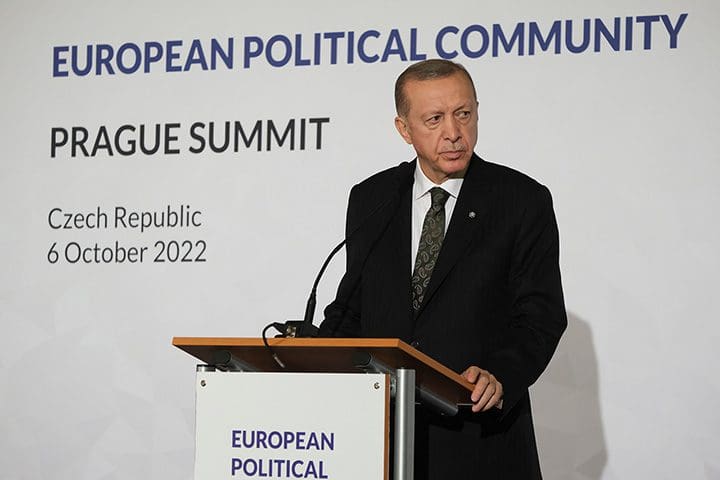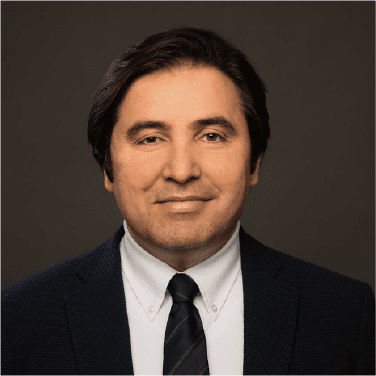Speaking to reporters at a press conference on the sidelines of the European Political Community meeting in Prague on October 6, Turkey’s President Recep Tayyip Erdogan created diplomatic waves by stating that he could meet with Syrian president Bashar Al-Assad “when the time is right.” Erdogan’s comment was the first of its kind since the start of the Syrian civil war in 2011, in which Turkey has been a central external combatant. Indeed, Syria appeared to be an exception to a recent Turkish policy of rapprochement with other erstwhile regional antagonists, including Egypt, Israel, the United Arab Emirates, and Saudi Arabia. With the new narrative coming from Ankara, has this changed? More broadly, what factors are motivating a potential thaw in Turkish relations with Syria? What are the priorities of each side in any prospective diplomatic engagement, and to what extent can they meet each other’s expectations?
Policy U-turns are not rare in President Erdogan’s long political career. The previously mentioned reset policy toward Turkey’s regional foes is a testament to this policy pragmatism. Yet even by this standard, Erdogan’s recent statement, which opened the door for a potential meeting with Assad, was noteworthy. No crisis in decades has occupied as large a place in Turkey’s foreign and security policies as Syria, and probably no other head of state has been as vilified in Turkish public and official discourse as Assad. In accounting for Turkey’s new narrative towards Syria and the regime, three factors are key: popular discontent over the issue of Syrian refugees and its potential impact in the upcoming parliamentary and presidential elections in Turkey, Russian influence, and the Kurdish file.
What is driving the change?
Turkey is set to have a highly consequential election in June 2023—with the possibility of it being held as early as May. In his re-election bid, Erdogan is facing two main policy challenges: an economy in tatters, and a refugee/migration crisis that is being increasingly politicized, largely by the opposition parties. While Erdogan’s foreign and security policies resonate well with the public, the government needs to signal that it can and will address these two issues in earnest. In an increasingly hostile social climate dotted with xenophobic outbursts, most of the political discussion addressing the refugees revolves around their total or partial refoulement to Syria. This approach views the engagement or normalisation with the Assad regime as a necessary precursor for a major return of refugees. In the run up to the election, the government likely wants to send a fraction of Turkey’s refugee population, even a very small one, back to Syria in order to appease the growing anti-refugee sentiments in Turkish society.
Secondly, one of the primary goals of Turkey’s Syria policy is to roll back the political and territorial gains of the Syrian Kurdish Democratic Union Party (PYD) and its military wing, the People’s Protection Units (YPG). To that end, Turkey undertook successive military operations between 2016 and 2019. As late as August 2022, Erdogan spoke of another impending military incursion against the PYD-YPG. However, Russia opposed this idea. Instead, Moscow has pushed Turkey to engage directly with Damascus in order to address its concerns regarding the PYD-YPG, the Syrian Kurdish autonomy project in general, and Turkey’s overall security concerns. Indeed, immediately after Erdogan met Russian President Vladimir Putin in Sochi on August 5, Turkish Foreign Minister Mevlut Cavusoglu advocated for a reconciliation between the Syrian opposition and the Assad regime as a way to protect the territorial unity of the war-ravaged country. In the same remarks, Cavusoglu also revealed that he had a brief meeting with his Syrian counterpart, Faisal Mekdad, on the sidelines of the Non-Aligned Movement meeting in Belgrade in October 2021.
Thirdly, Turkey has long given up on the idea of regime change in Damascus. Instead, it prioritizes reversing the gains made by the PYD-led Syrian Kurds. The Astana process that was launched by Turkey, Russia, and Iran in the closing days of 2016 was an indirect manifestation of this evolving priority. Astana has increasingly turned the Syrian opposition into Turkey’s proxy, whose goals, political disposition, and narrative have been heavily defined by Turkey’s national security priorities with little political agency of their own. Against this backdrop, Ankara and Damascus finding some form of a modus vivendi in their relations is a natural progression of events.
Would a rapprochement deliver results?
Despite Erdogan’s shift in narrative, no imminent breakthrough should be expected in Turkish-Syrian relations. The distrust between the sides is deep, and the policy gap wide.
The Turkish government’s consideration of the partial refoulement of Syrian refugees is not realistic on several grounds. To begin with, very few Syrians would voluntarily return to Syria’s active conflict zone, and there are limits to how many refugees the government can forcibly resettle. Moreover, while the Assad regime benefits internationally from entertaining the idea of refugee return, as it bolsters the call for reconstruction and rehabilitation, the regime opposes actual repatriation. Indeed, refugees are a good source of income for Syria through remittances, and the regime would probably not want to be deprived of the benefits that come from this. Thus far, there has been no large-scale return from any of the sizeable Syrian refugee populations in Lebanon, Jordan, and Iraqi Kurdistan.
Instead of a refugee refoulment policy, Ankara should do its utmost to prevent a new humanitarian catastrophe in north-western Syria, and future large-scale inflows of refugees into Turkey. Turkish-controlled areas remain unstable and Idlib is a tinderbox. This week, Hay’at Tahrir al-Sham (HTS), the group formerly known as Al-Nusra that controls Idlib and is internationally designated as a terrorist organization—including by Turkey—entered the Turkish-controlled city of Afrin, which triggered Russian airstrikes. Even though HTS withdrew from the city, likely after pressure from Ankara, the episode illustrated the fluidity and fragility of the conflict map in Syria. An escalation in fighting could result in fresh waves of refugees toward the Turkish border.
As such, engaging with the regime is unlikely to provide a panacea to Turkey’s refugee problem. Resolving this issue likely means integrating them inside Turkey, not forcing an involuntary return to Syria where their safety and security is at risk.
Although there is shared interest between Ankara and Damascus in seeing the Kurdish autonomy project in Syria scuttled or undermined, it is unlikely to translate itself into a common strategy or active cooperation in dealing with the Syrian Kurds. Moreover, the United States is the primary external actor in the mainly Kurdish-controlled northeastern Syria. Unless there is a change in U.S. policy, American military presence serves to constrain Ankara’s and the Assad regime’s policies toward Syrian-Kurdish autonomy.
The likely result
A new narrative does not necessarily mean a new policy. A potential reset between Ankara and Damascus is particularly difficult given the level of animosity between the sides, the large Turkish military presence on the ground in Syria, and the reality of a Turkish statelet in northern Syria.
Yet a change in narrative is still important. To start, it pierces a psychological barrier. Up to this point, most pro-government pundits and analysts have seen little value in direct talks between Ankara and Damascus at the ministerial or presidential level. Now the idea of engaging with the Syrian regime in order to address Turkey’s political and security concerns is set to become more mainstream, if not the new normal, in Turkish politics.
Secondly, a new narrative will probably bear implications for Turkey’s policy toolbox in Syria. To be more concrete, if this new orientation translates into an actual thaw, then the prospect of new Turkish military operations in Syria in confrontation with the regime would significantly decrease.
Thirdly, given Turkey’s heavy influence over the Syrian opposition, it is likely that Ankara would push harder to be open to the idea of reconciling with the regime despite the opposition’s own conditions and considerations.
Fourthly, the Astana process not only dramatically reshaped the conflict map in Syria, but it also redefined the nature of relations between Turkey, Russia, and Iran within the context of Syria. If a similar trilateral platform emerges between Turkey, Russia, and Syria with the aim of facilitating common ground between the three governments, this will offer an important structured framework to prospective Turkish–Syrian talks. It would also create yet another point of engagement for Ankara and Moscow, notwithstanding how the war in Ukraine impacts Russia’s presence in Syria, as well as the fledgling diplomacy between Ankara and Damascus.
Finally, Turkish opposition parties have long advocated for direct engagement with the Syrian regime. With the government’s new Syria narrative, both sides of Turkish political divides are now converging around the idea of a diplomatic solution and direct engagement with the regime in order to address Ankara’s concerns and priorities in Syria. While Turkey’s upcoming election in 2023 was one of the main impetuses for this change, the real diplomacy is likely to occur after the election.

